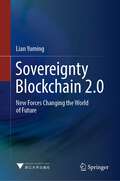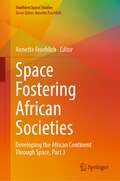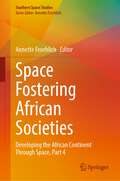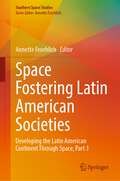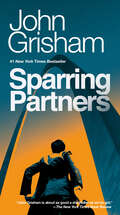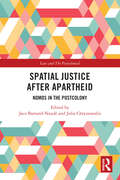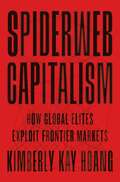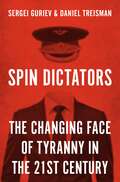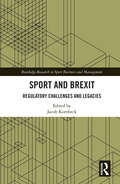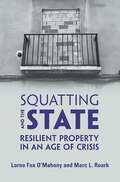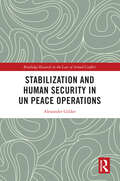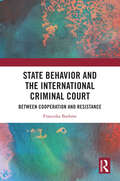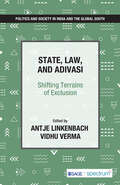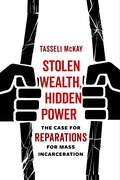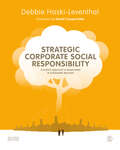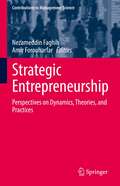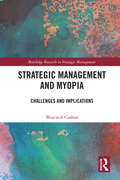- Table View
- List View
Sovereignty Blockchain 2.0: New Forces Changing the World of Future
by Lian YumingThis book is a continuation and deepening of Sovereign Blockchain 1.0. It mainly includes three views: 1) Blockchain is a super public product based on digital civilization. 2) The Internet is an advanced level of industrial civilization, the core of which is connection; blockchain is an important symbol of digital civilization, the essence of which is reconstruction. 3) Digital currency will trigger a comprehensive change in the economic field, and digital identity will reconstruct the governance model in the social field, thereby changing the order of civilization.This book is not only a popular science book based on blockchain thinking, theory and application research, but also a scholarly work on the technical and philosophical issues of governance and the future. By reading Sovereign Blockchain 2.0, policymakers can quickly understand the basic knowledge and frontier dynamics of science and technology; science and technology workers can grasp the general trend, seize opportunities, face problems and difficulties, aim at the world's science and technology frontier and lead the direction of science and technology development; experts and scholars in law and legal fields can see new ideas, concepts and models of data governance; social science researchers can discover data sociology and data philosophy issues.
Soziale Netzwerke – Die Familie von heute: Recht und Politik der Regulierung
by Vanessa KirchSoziale Netzwerke haben eine Fülle von Problemen in Bezug auf die Privatsphäre und den Schutz personenbezogener Daten aufgeworfen. Die Nutzung sozialer Netzwerke ist zu einem zentralen Anliegen von Rechtswissenschaftlern, politischen Entscheidungsträgern und den Betreibern sowie den Nutzern dieser sozialen Netzwerke geworden. Dieses bahnbrechende Buch beleuchtet die Bedeutung des Datenschutzes im Zusammenhang mit den neuen elektronischen Kommunikationstechnologien von heute, da es widersprüchliche Ansprüche zum Schutz der nationalen und internationalen Sicherheit, der Freiheit des Internets und wirtschaftlicher Überlegungen aufzeigt. Auf der Grundlage des intellektuellen Rahmens der New Haven School of Jurisprudence stellt der Autor das geltende Recht zum Schutz der Privatsphäre und zu sozialen Medien in internationaler und vergleichender Perspektive dar und konzentriert sich dabei auf die Vereinigten Staaten, die Europäische Union und ihre Allgemeine Datenschutzverordnung von 2018 sowie auf Deutschland, das Vereinigte Königreich und Lateinamerika. Das Buch bewertet das geltende Recht, erörtert Alternativen und gibt Empfehlungen für eine öffentliche Ordnung der Menschenwürde. Übersetzt mit www.DeepL.com/Translator (kostenlose Version)
Space Fostering African Societies: Developing the African Continent Through Space, Part 3 (Southern Space Studies)
by Annette FroehlichThis peer-reviewed book provides detailed insights into how space and its applications are, and can be used to support the development of the full range and diversity of African societies, as encapsulated in the African Union’s Agenda 2063. Following on from Part 1 and 2, which were highly acclaimed by the space community, it focuses on the role of space in supporting the UN Sustainable Development Goals in Africa, but covers an even more extensive array of relevant and timely topics addressing all facets of African development. It demonstrates that, while there have been significant achievements in recent years in terms of economic and social development, which have lifted many of Africa’s people out of poverty, there is still a great deal that needs to be done to fulfill the basic needs of Africa's citizens and afford them the dignity they deserve. To this end, space is already being employed in diverse fields of human endeavor to serve Africa’s goals for its future, but there is much room for further incorporation of space systems and data. Providing a comprehensive overview of the role space is playing in helping Africa achieve its developmental aspirations, the book will appeal to both students and professionals in fields such as space studies, international relations, governance, and social and rural development.
Space Fostering African Societies: Developing the African Continent Through Space, Part 4 (Southern Space Studies)
by Annette FroehlichThis peer-reviewed book provides detailed insights into how space and its applications are, and can be used to support the development of the full range and diversity of African societies, as encapsulated in the African Union’s Agenda 2063. Following on from Part 1 to Part 3, which was highly acclaimed by the space community, it focuses on the role of space in supporting the UN Sustainable Development Goals in Africa, but covers an even more extensive array of relevant and timely topics addressing all facets of African development. It demonstrates that, while there have been significant achievements in recent years in terms of economic and social development, which have lifted many of Africa’s people out of poverty, there is still a great deal that needs to be done to fulfill the basic needs of Africa's citizens and afford them the dignity they deserve. To this end, space is already being employed in diverse fields of human endeavor to serve Africa’s goals for its future, but there is much room for further incorporation of space systems and data. Providing a comprehensive overview of the role space is playing in helping Africa achieve its developmental aspirations, the book will appeal to both students and professionals in fields such as space studies, international relations, governance, social, rural and technical development.
Space Fostering Latin American Societies: Developing the Latin American Continent Through Space, Part 3 (Southern Space Studies)
by Annette FroehlichThis peer-reviewed book presents a comprehensive overview of the role space is playing in enabling Latin America to fulfill its developmental aspirations. Following on from the highly acclaimed Part 1 and Part 2, it explains how space and its applications can be used to support the development of the full range and diversity of Latin America societies, while being driven by Latin American goals. The Latin American space sector is currently undergoing a phase of rapid and dynamic expansion, with new actors entering the field and with space applications increasingly being used to support the continent’s social, economic, and political development. All across Latin America, attention is shifting to space as a fundamental part of the continental development agenda, and the creation of a Latin American space agency is evidence of this. Additionally, while in recent years, significant advances in economic and social development have lifted many of Latin America’s people out of poverty, there is still much that needs to be done to fulfill the basic needs of the population and to afford them the dignity they deserve. To this end, space is already being employed in diverse fields of human endeavor to serve Latin America’s goals for its future, but there is still a need for further incorporation of space systems and data. This book will appeal to researchers, professionals and students in fields such as space studies, international relations, governance, and social and rural development.
Sparring Partners: Novellas (Jake Brigance #4)
by John Grisham#1 NEW YORK TIMES BESTSELLER • John Grisham is the acknowledged master of the legal thriller. In his first collection of novellas, law is a common thread, but America&’s favorite storyteller has several surprises in store. &“Homecoming&” takes us back to Ford County, the fictional setting of many of John Grisham&’s unforgettable stories. Jake Brigance is back, but he&’s not in the courtroom. He&’s called upon to help an old friend, Mack Stafford, a former lawyer in Clanton, who three years earlier became a local legend when he stole money from his clients, divorced his wife, filed for bankruptcy, and left his family in the middle of the night, never to be heard from again—until now. Now Mack is back, and he&’s leaning on his old pals, Jake and Harry Rex, to help him return. His homecoming does not go as planned.In &“Strawberry Moon,&” we meet Cody Wallace, a young death row inmate only three hours away from execution. His lawyers can&’t save him, the courts slam the door, and the governor says no to a last-minute request for clemency. As the clock winds down, Cody has one final request. The &“Sparring Partners&” are the Malloy brothers, Kirk and Rusty, two successful young lawyers who inherited a once prosperous firm when its founder, their father, was sent to prison. Kirk and Rusty loathe each other, and speak to each other only when necessary. As the firm disintegrates, the resulting fiasco falls into the lap of Diantha Bradshaw, the only person the partners trust. Can she save the Malloys, or does she take a stand for the first time in her career and try to save herself?By turns suspenseful, hilarious, powerful, and moving, these are three of the greatest stories John Grisham has ever told. Don&’t miss John Grisham&’s new book, THE EXCHANGE: AFTER THE FIRM!
Spatial Justice After Apartheid: Nomos in the Postcolony (Law and the Postcolonial)
by Jaco Barnard-Naudé and Julia ChryssostalisThis book considers the question of spatial justice after apartheid, from several disciplinary perspectives – jurisprudence, law, literature, architecture, photography and psychoanalysis are just some of the disciplines engaged here. However, the main theoretical device on which the authors comment is the legacy of what in Carl Schmitt’s terms is nomos as the spatialised normativity of sociality. Each author considers within the practical and theoretical constraints of their topic, the question of what nomos in its modern configuration may or may not contribute to a thinking of spatial justice after apartheid. On the whole, the collection forces a confrontation between law’s spatiality in a "postcolonial" era, on the one hand, and the traumatic legacy of what Paul Gilroy has called the "colonial nomos", on the other hand. In the course of this confrontation, critical questions of continuation, extension, disruption, and rewriting are raised and confronted in novel and innovative ways that both challenge Schmitt’s account of nomos and affirm the centrality of the constitutive relation between law and space. The book promises to resituate the trajectory of nomos, while considering critical instances through which the spatial legacy of apartheid might at last be overcome. This interdisciplinary book will appeal to scholars of critical legal theory, political philosophy, aesthetics and architecture.
Spatial Planning in Poland: Law, Property Market and Planning Practice (SpringerBriefs in Geography)
by Maciej J. Nowak Przemysław Śleszyński Paulina Legutko-KobusThis book defines the dilemmas related to the interface between legal regulations and planning practice in the spatial management system. Based on specific case studies, it gives examples of possible problems and ways of solving them. It applies to Poland's standard and the determinants of spatial policy in other countries. It provides the basis for a developed international discussion and concretely suggests specific actions at local, regional and national levels.
Speciesism in Biology and Culture: How Human Exceptionalism is Pushing Planetary Boundaries
by Brent D. Mishler Brian SwartzThis open access book explores a wide-ranging discussion about the sociopolitical, cultural, and scientific ramifications of speciesism and world views that derive from it. In this light, it integrates subjects across the natural sciences, social sciences, and humanities. The 21st-century western world is anthropocentric to an extreme; we adopt unreasonably self-centered and self-serving ideas and lifestyles. Americans consume more energy resources per person than most other nations on Earth and have little concept of how human ecology and population biology interface with global sustainability. We draw upon religion, popular culture, politics, and technology to justify our views and actions, yet remain self-centered because our considerations rarely extend beyond our immediate interests. Stepping upward on the hierarchy from “racism,” “speciesism” likewise refers to the view that unique natural kinds (species) exist and are an important structural element of biodiversity. This ideology manifests in the cultural idea that humans are distinct from and intrinsically superior to other forms of life. It further carries a plurality of implications for how we perceive ourselves in relation to nature, how we view Judeo-Christian religions and their tenets, how we respond to scientific data about social problems such as climate change, and how willing we are to change our actions in the face of evidence.
Spiderweb Capitalism: How Global Elites Exploit Frontier Markets
by Kimberly Kay HoangA behind-the-scenes look at how the rich and powerful use offshore shell corporations to conceal their wealth and make themselves richerIn 2015, the anonymous leak of the Panama Papers brought to light millions of financial and legal documents exposing how the superrich hide their money using complex webs of offshore vehicles. Spiderweb Capitalism takes you inside this shadow economy, uncovering the mechanics behind the invisible, mundane networks of lawyers, accountants, company secretaries, and fixers who facilitate the illicit movement of wealth across borders and around the globe.Kimberly Kay Hoang traveled more than 350,000 miles and conducted hundreds of in-depth interviews with private wealth managers, fund managers, entrepreneurs, C-suite executives, bankers, auditors, and other financial professionals. She traces the flow of capital from offshore funds in places like the Cayman Islands, Samoa, and Panama to special-purpose vehicles and holding companies in Singapore and Hong Kong, and how it finds its way into risky markets onshore in Vietnam and Myanmar. Hoang reveals the strategies behind spiderweb capitalism and examines the moral dilemmas of making money in legal, financial, and political gray zones.Dazzlingly written, Spiderweb Capitalism sheds critical light on how global elites capitalize on risky frontier markets, and deepens our understanding of the paradoxical ways in which global economic growth is sustained through states where the line separating the legal from the corrupt is not always clear.
Spin Dictators: The Changing Face of Tyranny in the 21st Century
by Daniel Treisman Sergei GurievHow a new breed of dictators holds power by manipulating information and faking democracyHitler, Stalin, and Mao ruled through violence, fear, and ideology. But in recent decades a new breed of media-savvy strongmen has been redesigning authoritarian rule for a more sophisticated, globally connected world. In place of overt, mass repression, rulers such as Vladimir Putin, Recep Tayyip Erdogan, and Viktor Orbán control their citizens by distorting information and simulating democratic procedures. Like spin doctors in democracies, they spin the news to engineer support. Uncovering this new brand of authoritarianism, Sergei Guriev and Daniel Treisman explain the rise of such “spin dictators,” describing how they emerge and operate, the new threats they pose, and how democracies should respond.Spin Dictators traces how leaders such as Singapore’s Lee Kuan Yew and Peru’s Alberto Fujimori pioneered less violent, more covert, and more effective methods of monopolizing power. They cultivated an image of competence, concealed censorship, and used democratic institutions to undermine democracy, all while increasing international engagement for financial and reputational benefits. The book reveals why most of today’s authoritarians are spin dictators—and how they differ from the remaining “fear dictators” such as Kim Jong-un and Bashar al-Assad, as well as from masters of high-tech repression like Xi Jinping.Offering incisive portraits of today’s authoritarian leaders, Spin Dictators explains some of the great political puzzles of our time—from how dictators can survive in an age of growing modernity to the disturbing convergence and mutual sympathy between dictators and populists like Donald Trump.
Sport and Brexit: Regulatory Challenges and Legacies (Routledge Research in Sport Business and Management)
by Jacob KornbeckThis is the first book to investigate the significance of Brexit for sport, with a particular focus on the regulatory and legal challenges that it poses, and the economic and political stresses that are likely to follow in its wake. Written by a team of leading researchers working across sport studies, legal studies and political science, and edited by an EU official with nearly two decades of experience working in EU sport policy, the book explains why regulation, and European dis-integration, matter to sport. It examines key topics including free movement, State aid and labour law, and considers the interests of key stakeholders from fans to football clubs to governing bodies. This is an essential reference for any advanced student, researcher, policy maker, administrator or industry professional working in sport, international law, political science, or international business and management.
Squatting and the State: Resilient Property in an Age of Crisis
by Lorna Fox O'Mahony Marc L. RoarkSquatting and the State offers a new theoretical and methodological approach for analyzing state response to squatting, homelessness, empty land, and housing. Embedded in local, national, and transnational contexts, and reaching beyond conventional property theories, this important work sets out a fresh analytical paradigm for understanding the deep, interlocking problems facing not just the traditional 'victims' of narratives about homelessness and squatting but also a variety of other participants in these conflicts. Against the backdrop of economic, social, and political crises, Squatting and the State offers readers important insights about the changing natures of property, investment, housing, communities, and the multi-level state, and describes the implications of these changes for how we think and talk about property in law.
Stabilization and Human Security in UN Peace Operations (Routledge Research in the Law of Armed Conflict)
by Alexander GilderUN peace operations are increasingly asked to pursue stabilization mandates with lofty expectations of being able to stabilize conflict zones, achieve national reconciliation, and rebuild state legitimacy. This book investigates the relationship between UN stabilization mandates and the concept of ‘human security’. The book is divided into three parts. Part I outlines the emergence of stabilization and other trends in peacekeeping practice and outlines an analytical framework of human security. Part II applies the analytical framework to case studies of MINUSMA, MINUSCA, and UNMISS examining issues, such as human rights, empowerment, protection, and vulnerability. In Part III the book draws out several concerns that arise from stabilization mandates, including the militarisation of UN peace operations and the consequences under international humanitarian law, the risks of close cooperation with the host state and engagement in counter-terror activities, and the potential clash between peacebuilding activities and militarisation. The book will be a valuable resource for academics, policymakers and practitioners working on UN peacekeeping generally, and those specifically looking at stabilization, from the perspective of international relations, international law, peace and conflict studies, security studies and human rights.
Standard-Setting Organisations’ IPR Policies: Intellectual Property and Competition Issues
by Manveen SinghThis book offers a unique insight into the world of standard-setting organizations (SSOs)’ IPR policies and the role they play in balancing the interests of innovators and implementers, vis-à-vis the development of standards. Since the beginning of the 21st century, there have been quite a few questions asked of the SSOs as to the legality of their IPR policies and the enforceability of disclosure and licensing obligations enshrined therein. That, coupled with disagreements over the appropriate royalty rate and royalty base, has resulted in extensive litigation between innovators and implementers, especially across the Atlantic. The Book, in keeping the USA and EU as the two primary jurisdictions, offers a comprehensive analysis of the disclosure and licensing obligations under SSO IPR policies, with strong theoretical foundations justifying their imposition. More specifically, it offers a bird’s eye view of the various facets of disclosure and licensing, ranging from non-disclosure and transparency on one hand, to the determination of FRAND on the other. While much has been said about the benefits arising out of collaborative standard-setting, disputes involving SEP licensing have not been limited to the courts, and have attracted a significant amount of scrutiny by competition/antitrust agencies. The Book provides an elaborate account of the anti-competitive concerns surrounding standard-setting, and further documents the role of courts and competition agencies in ensuring good faith licensing negotiations between the SEP holders and implementers. Despite largely focusing on SEP licensing disputes in the USA and EU, the Book also offers a dedicated chapter on standard-setting in the Indian context. The readers are presented with an in-depth discussion on the contrasting approaches adopted by the courts and the Competition Commission of India (CCI), in addressing disputes involving SEPs. The said discussion is supplemented by a careful analysis of the SEP licensing guidelines to have emerged out of other implementer-oriented economies like China and Japan. By doing so, the Book offers readers the opportunity to study and compare the SEP licensing framework in developed, as well as developing economies. SSO IPR policies play an integral role in the development of standards, and with technologies such as the Internet of Things and 5G knocking on the doors, the Book makes for a valuable study on the nuances of standard-setting through the lens of SSOs, and will find takers among a wide reader base of students, researchers, academics, law practitioners, corporates, and policy makers.
State Behavior and the International Criminal Court: Between Cooperation and Resistance
by Franziska BoehmeThis book analyses patterns and causes of state cooperation with the International Criminal Court. The work focuses on several African cases, including those against leading state officials, to dive into current debates about compliance with international law and resistance to international courts. The book, which draws on interview data collected in The Hague, Kenya, and South Africa, reveals the diversity of state behaviors ranging from full compliance and diplomatic support to partial compliance to resistance and exit. This redirects the widespread narrative about African resistance against the ICC to include evidence of continued Court support. It is argued that the degree of cooperation the Court receives is affected by a government’s perceived costs and benefits of executing an ICC request: a cooperation request is considered high-cost or low-cost depending on the suspect’s position, the type of action requested, and the government’s domestic and regional policy objectives. In response, the Court has been careful not to alienate states further, thus highlighting that the Court is both above and below the state: having the power to charge individuals including state officials, but relying on governments—sometimes those from which suspects hail—to provide critical information about the same suspects. The book will be of interest to academics, researchers and policy-makers working in the areas of international law, human rights, international criminal justice, and international relations.
State Immunity and International Investment Law
by Zixin MengThe book provides a sophisticated analysis of state immunity from an enforcement perspective. It covers all relevant legal techniques of enforcing an arbitral award against a sovereign state. Besides tackling the plea of state immunity through the courts, this book also covers notable non-judicial remedial measures which may aid the aggrieved investors in satisfying their claims against state parties to a dispute. These measures may be used either to enhance the effectiveness of judicial remedies or as stand-alone remedies when legal measures seem (or prove to be) ineffective. After having identified problems arising from a lack of universal agreement on state immunity and the diversity and, more dishearteningly, the inadequacy of forms of enforcement available to an aggrieved claimant, this book proposes a new approach to solve state immunity issues. The international community must work towards the setting up of a central enforcement agency, a functional model of enforcement.
State, Law, and Adivasi: Shifting Terrains of Exclusion
by Vidhu Verma Antje LinkenbachThis volume presents an overview of the relationship between the state, law, and Adivasis that have experienced a profound political shift due to privatization of natural resources. It discusses the role of the corporates and its impact on livelihoods of the Adivasis in India. For the Indian state, a significant challenge is to establish a new normative framework for indigenous autonomy based on the values of equality and sustainability. This calls for recognition of the right to self-determination and exercise of collective rights of the Adivasis. The chapters in this volume examine: • 'Exclusion' as a useful framework for analyzing the various axes of inequality that affect the Adivasi communities • How state, development, and Adivasi politics play out in entangled ways in the social, political and legal domains • The interplay of and the deep tension between the promise of legal protection and the realities of inadequate implementation.
Stealing My Religion: Not Just Any Cultural Appropriation
by Liz BucarFrom sneaker ads and the “solidarity hijab” to yoga classes and secular hikes along the Camino de Santiago pilgrimage route, the essential guide to the murky ethics of religious appropriation.We think we know cultural appropriation when we see it. Blackface or Native American headdresses as Halloween costumes—these clearly give offense. But what about Cardi B posing as the Hindu goddess Durga in a Reebok ad, AA’s twelve-step invocation of God, or the earnest namaste you utter at the end of yoga class?Liz Bucar unpacks the ethical dilemmas of a messy form of cultural appropriation: the borrowing of religious doctrines, rituals, and dress for political, economic, and therapeutic reasons. Does borrowing from another’s religion harm believers? Who can consent to such borrowings? Bucar sees religion as an especially vexing arena for appropriation debates because faiths overlap and imitate each other and because diversity within religious groups scrambles our sense of who is an insider and who is not. Indeed, if we are to understand why some appropriations are insulting and others benign, we have to ask difficult philosophical questions about what religions really are.Stealing My Religion guides us through three revealing case studies—the hijab as a feminist signal of Muslim allyship, a study abroad “pilgrimage” on the Camino de Santiago, and the commodification of yoga in the West. We see why the Vatican can’t grant Rihanna permission to dress up as the pope, yet it’s still okay to roll out our yoga mats. Reflecting on her own missteps, Bucar comes to a surprising conclusion: the way to avoid religious appropriation isn’t to borrow less but to borrow more—to become deeply invested in learning the roots and diverse meanings of our enthusiasms.
Stem Cell Transplantations Between Siblings as Social Phenomena: The Child’s Body and Family Decision-making (Philosophy and Medicine #144)
by Christoph Rehmann-Sutter Christina Schües Martina Jürgensen Madeleine HerzogThis open access book offers insights in short- and long-term experiences from families with bone marrow transplantations between minor siblings. It is based on the first extended qualitative study with 17 families about experiences with recent transplants and experiences with transplants up to 20 years in the past. It covers reflections of donors, recipients and other family members, as well as family interactions. Transplantation of bone marrow from one sibling to another who is ill with a blood cancer (such as Leukemia) is a life-saving therapy. Young children however are not in a position to give consent themselves. How should they be adequately included, depending to their age? Which ethical questions are raised for the parents both at the time of treatment and afterwards, and for the medical professionals in clinical and regulatory contexts? For an in-depth discussion of the findings the books brings together a group of leading scholars from the fields of bioethics, family sociology and philosophy of medicine.
Stolen Wealth, Hidden Power: The Case for Reparations for Mass Incarceration
by Tasseli McKayA meticulous and exhaustive accounting of the total economic devastation wreaked on Black communities by mass incarceration with an action guide for vital reparations.Stolen Wealth, Hidden Power is a staggering account of the destruction wrought by mass incarceration. Finding that the economic value of the damages to Black individuals, families, and communities totals $7.16 trillion—roughly 86 percent of the current Black–White wealth gap—this compelling and exhaustive analysis puts unprecedented empirical heft behind an urgent call for reparations. Much of the damage of mass incarceration, Tasseli McKay finds, has been silently absorbed by families and communities of the incarcerated—where it is often compensated for by women’s invisible labor. Four decades of state-sponsored violence have destroyed the health, economic potential, and political power of Black Americans across generations. Grounded in principles of transitional justice that have guided other nations in moving past eras of state violence, Stolen Wealth, Hidden Power presents a comprehensive framework for how to begin intensive individual and institutional reparations. The extent of mass incarceration’s racialized harms, estimated here with new rigor and scope, points to the urgency of this work and the possibilities that lie beyond it.
Strategic Corporate Social Responsibility: A Holistic Approach to Responsible and Sustainable Business
by Debbie Haski-LeventhalWith the changing expectations of consumers, employees and regulators, being best in the world is no longer enough. Businesses are now also expected to be best for the world: to be socially and environmentally responsible, sustainable and ethical. Based on the idea that strategic CSR offers the most holistic and effective approach to corporate social responsibility, the author presents the key concepts, theories and philosophical approaches to CSR, along with the practical tools needed to implement this knowledge in the real world. The book is split into three parts; the first part provides the theoretical background of CSR, the second part examines various CSR approaches and how they can be implemented, and the third part discusses measuring and communicating CSR. New this edition is also a chapter titled ‘The S in CSR: Social and Global Issues’. Each chapter contains questions for reflection & discussion, exercises, and case studies from globally recognised brands such as Ben & Jerry′s, Google, H&M, Johnson & Johnson, Nestlé, Patagonia, Puma, Unilever and Whole Foods. The book is complemented by chapter specific lecturer PowerPoint slides, a draft syllabus and an instructor′s manual. Suitable reading for students on Corporate Social Responsibility modules.
Strategic Corporate Social Responsibility: A Holistic Approach to Responsible and Sustainable Business
by Debbie Haski-LeventhalWith the changing expectations of consumers, employees and regulators, being best in the world is no longer enough. Businesses are now also expected to be best for the world: to be socially and environmentally responsible, sustainable and ethical. Based on the idea that strategic CSR offers the most holistic and effective approach to corporate social responsibility, the author presents the key concepts, theories and philosophical approaches to CSR, along with the practical tools needed to implement this knowledge in the real world. The book is split into three parts; the first part provides the theoretical background of CSR, the second part examines various CSR approaches and how they can be implemented, and the third part discusses measuring and communicating CSR. New this edition is also a chapter titled ‘The S in CSR: Social and Global Issues’. Each chapter contains questions for reflection & discussion, exercises, and case studies from globally recognised brands such as Ben & Jerry′s, Google, H&M, Johnson & Johnson, Nestlé, Patagonia, Puma, Unilever and Whole Foods. The book is complemented by chapter specific lecturer PowerPoint slides, a draft syllabus and an instructor′s manual. Suitable reading for students on Corporate Social Responsibility modules.
Strategic Entrepreneurship: Perspectives on Dynamics, Theories, and Practices (Contributions to Management Science)
by Nezameddin Faghih Amir ForouharfarThe result of the application of strategic management philosophy to the nexus of entrepreneurship, innovation, and economy, strategic entrepreneurship fosters sustainable development and competitiveness. This volume provides an introduction to the theories of strategic entrepreneurship and accounts of their real-world applications in the entrepreneurial sector. The book is divided into three parts. Chapters in Part I discuss strategic entrepreneurship dynamics and mechanisms. Chapters in Part II focus on strategic entrepreneurship concepts and theories. Chapters in Part III provide global examples of strategic entrepreneurship practices in action. Presenting a view of strategic entrepreneurship across diverse sectors and industries, this edited volume will be attractive to researchers and students interested in management, entrepreneurship, economics, public administration, and public policy, as well as corporate strategists, managers, and policymakers looking to integrate the principles of strategic entrepreneurship.
Strategic Management and Myopia: Challenges and Implications (Routledge Research in Strategic Management)
by Wojciech CzakonThis book investigates the phenomenon of strategic myopia, which refers to important cognitive distortions that managers systematically display. It captures narrow views and preferences, which are likely to hurt firms’ long-term prospects. Instead of accusing managers of imperfections, opportunism or blindness, this book explains how strategic myopia stems from individual dispositions, how it is shaped by team contingencies, and encouraged by organisations’ design. The reader will learn how a metaphor introduced to explain business failure evolved over decades to become a concept useful in understanding intertemporal choices, technology substitution, competitive advantage erosion, competitive blind-spots and missed opportunities. In addition to explaining the mechanisms that encourage myopic behaviours, readers are offered a set of effective ways to address strategic myopia. A key benefit of this work is that the structure of the book allows the use of chapters separately. The core message is that eliminating strategic myopia is hardly possible, and may actually hurt the firms’ short-term efficiency. However, organisations may develop capabilities, and implement designs that favour balancing the short-term benefits of myopia and alleviate its long-term drawbacks. This book will be of interest to scholars, researchers, advanced students and experienced managers in the fields of strategic management and organisational behaviour.
